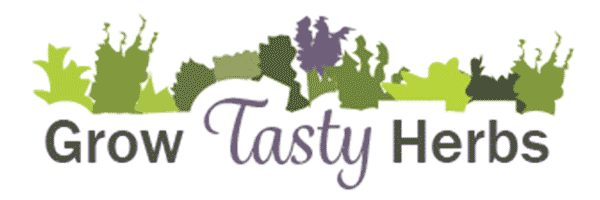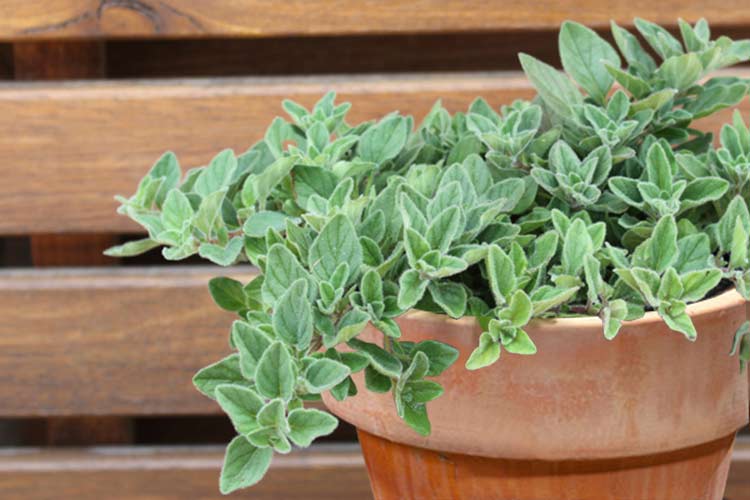Many of our modern culinary herbs are very well suited to pot culture, so well suited that they are often sold in green grocers as small potted plants.
Herbs such as basil, parsley, coriander, mint, rosemary, sage, oregano, chives and thyme can all be harvested in small amounts from fairly small immature plants which makes them ideal as high turnover fresh herbs in stores. These herbs are fairly hardy plants which will grow well in a wide variety of climates and conditions. They are also the staple herbs for the modern Australian kitchen which are all great reasons to grow them at home.
Most herbs will grow well in pots with a little care. They can form the backbone of an edible potted garden, whether that is a large collection of pots or a few pots on the kitchen window sill.
As with all plants, when grown in a pot instead of the garden bed, the herbs are far more reliant on you for their care. They will need more attention in a pot than they will in the garden. In addition, the more you wish to harvest from them, the more care they will need to ensure they have enough growth to keep up with your demand.
Small pots on a windowsill are suitable for the smaller herbs. Small pots will not allow the plants enough root space to grow large and therefore the plants will remain smallish and only small amounts will be available for harvesting. If you wish to grow only small herbs on the windowsill, you may be best with potted herbs from the greengrocer which you can replace often. If you wish your plants to flourish in this situation, take care to purchase compact and dense growing plants which will cope better with the small pots than larger plants will. The new range of Herbs will be ideal for this situation as they are compact, dense and highly ornamental.
As a general rule with pots, the smaller the pot, the faster it will dry out and the more attention the pot plant will need in order to thrive. Small pots have less soil space so less space for root growth which tends to result in a smaller plant, and also less ability to provide nutrients through the soil, so they will also need to be fertilised more often than will larger pots.
Larger pots on a balcony or courtyard give more options for a larger variety of herbs to grow, and for larger plants which will provide more for harvesting.
The main culinary herbs have fairly similar growing requirements so will usually do very well in a mixed planter or large pot. The pots will need to be positioned to receive plenty of sunlight – at least 6 hours of sun per day is best. In hot areas shelter from the harsh western sun is a good idea.
Plant the more hardy herbs – rosemary, oregano, sage, thyme and chives on the sunniest side of the combination (either in a cluster of smaller pots or one large planter), and the more tender parsley, coriander and basil on the shadier side where they will be a little sheltered by the other herbs. Mints are best in separate pots as they like more water than most of the other herbs and will tend to grow more vigorously resulting in the other herbs being smothered.
Whilst herbs are not demanding plants in the garden, in a pot they will need additional care. The more a herb is harvested, the more water and fertiliser they will need.
Always start a potted garden with suitable pots and good quality potting mix. Most of the cheaper varieties of potting mix are not at all suitable for growing herbs. You can read more about choosing suitable pots for your herbs here.
Most herbs prefer good drainage, but in pots this can also mean they dry out readily. Herbs in pots are usually more forgiving of a little drying out than are most vegetables, however care should be taken to ensure they receive adequate water. For a large potted herb garden, stacking garden or wall garden, this may mean a simple irrigation system needs to be installed with the pots. Herbs which are allowed to dry out too much may not always die but will perform badly and have far fewer tasty leaves to harvest. You can read more about growing herbs in wall gardens here.
Potted herbs can be given a regular treatment with a seaweed solution for optimum health. Regular applications of small amounts of fertiliser will also be beneficial, especially if you are harvesting the herbs often. In general herbs are not heavy feeders so take care not to over fertilise.
If you have a worm farm, you will find the worm juice and also the worm castings very beneficial to the health of your herbs and will largely negate the need for using any other fertilisers.
All potted plants will need repotting every so often as the potting mix will become depleted over time. If you are growing annual herbs such as parsley, coriander or basil it is as simple as always using fresh potting mix when you replace your plants. For perennial herbs or large planters replacing the potting mix annually is not as easy. Old potting mix can be revived by poking holes into the potting mix with a pencil (not to close to the stem so as not to damage roots) and then topping the pot up with fine compost or worm castings. If the old mix has become very dry this may need to be watered in with very slightly soapy water or a seaweed solution to increase water penetration.
Potted herbs bring the joy of gardening and growing your own food to within reach of almost everyone. They can be very easy to grow and to find space for even in the smallest unit.
*Article published by Kate Wall






